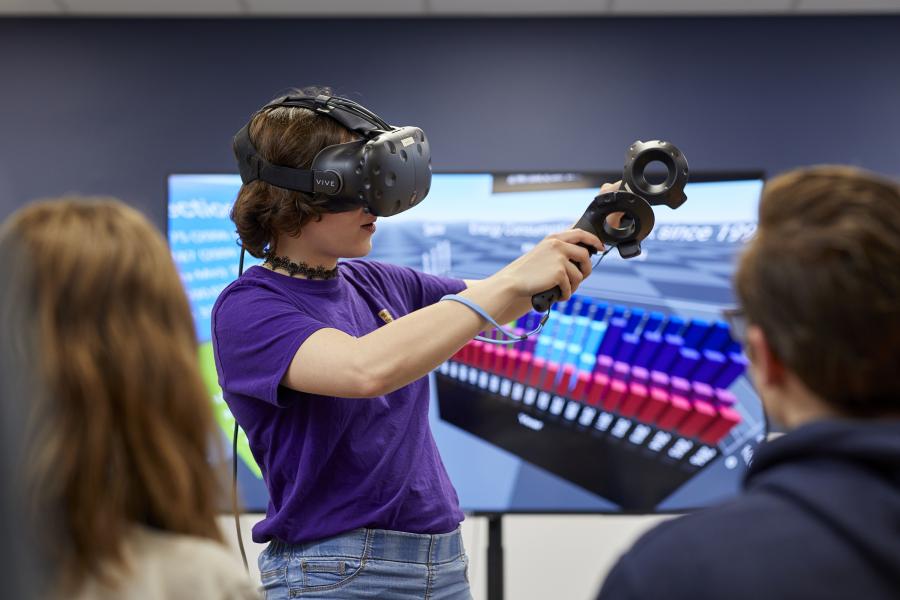About This Course
This degree provides a firm footing in data handling, analysis and communication of findings and modern research-driven machine learning techniques. This degree bridges the gap between the technical analysis of data, and the wider world. Data is a wonderful thing, but unfortunately nothing can change unless the insights cannot be conveyed to the wider world. The course focuses on how to best craft and present the arguments, explanations, and insight found in data to those that need to act.
Visualisation explores the tools to unlock the data we so readily generate. Today’s world runs on algorithms and data, interpreting that data is at the heart of this degree programme. The use of data is becoming known as the Industrial Revolution 4.0, and industries are rushing to realise the potential that Data Science and Visualisation can offer. We’ve designed this course to provide the mathematical, technical and theoretical knowledge and skills to enable you to work on the cutting edge technology needed for this new data frontier, with a focus on communication this to others. This degree is focused on the visual presentation and interpretation alongside the methods that can be used to unlock the deeper meaning in data. Graduates are ideally suited to take up careers in data and financial analysis, business intelligence, data support or closely related positions.
This degree provides an inventive combination of computer science fundamentals, programming, data analysis, critical reasoning and visualisation. The programme produces graduates that are proficient in using data to derive insight using up-to-the-minute methods and approaches.
In addition, the programme places a premium on responsible use of data. It champions the professional values needed when using the immense power of modern analytics, and an appreciation of relevant ethical, legal and social issues is embedded throughout. You will also be equipped with the transferable skills needed for any knowledge economy position; teamwork, communication, self-management, independence and discipline.
Why choose Bangor University for this course?
- This course is strengthened by our close links with the computer industry, including Parc Menai business park, where many tech companies have offices.
- We are an Oracle Academy Institutional Member.
- We have recently installed a large networking laboratory – designed to provide the opportunity to design and administer networks and to support the delivery of computer architecture modules.
Additional Course Options
This course is available with a Placement Year option where you will study for 1 additional year. The Placement Year is undertaken at the end of the second year and students are away for the whole of the academic year.
The Placement Year provides you with a fantastic opportunity to broaden your horizons and develop valuable skills and contacts through working with a self-sourced organisation relevant to your degree subject. The minimum period in placement (at one or more locations) is seven calendar months; more usually you would spend 10-12 months with a placement provider. You would normally start sometime in the period June to September of your second year and finish between June and September the following year. Placements can be UK-based or overseas and you will work with staff to plan and finalise the placement arrangements.
You will be expected to find and arrange a suitable placement to complement your degree and will be fully supported throughout by a dedicated member of staff at your academic School and the University’s Careers and Employability Services.
You will have the opportunity to fully consider this option when you have started your course at Bangor and can make an application for a transfer onto this pathway at the appropriate time. Read more about the work experience opportunities that may be available to you or, if you have any questions, please get in touch.
This course is available with an International Experience Year option where you will study or work abroad for 1 additional year. You will have ‘with International Experience’ added to your degree title on graduating.
Studying abroad is a great opportunity to see a different way of life, learn about new cultures and broaden your horizons. With international experience of this kind, you’ll really improve your career prospects. There are a wide variety of destinations and partner universities to choose from. If you plan to study in a country where English is not spoken natively, there may be language courses available for you at Bangor and in your host university to improve your language skills.
You will have the opportunity to fully consider this option at any time during your degree at Bangor and make your application. If you have any questions in the meantime, please get in touch.
Read more about the International Experience Year programme and see the studying or working abroad options on the Student Exchanges section of our website.
Course Content
DS+V allows you to become one of the most important parts of the soon-to-be data driven economy. You’ll learn to both ‘Speak Data’ and ‘Speak Sense’, giving you the power to communicate the hidden messages unlocked from the world’s data. Become an integral part of the new conversation that is helping shape the modern world.
Modules for the current academic year
Module listings are for guide purposes only and are subject to change. Find out what our students are currently studying on the Data Science and Visualisation BSc (Hons) Modules page.
Course content is for guidance purposes only and may be subject to change.
Facilities
Computer Science facilities
- Large, fully equipped computing laboratories and all the latest software.
- A recently installed immersive technologies laboratory, where the latest devices are used for project and research work.
- A recently installed large networking laboratory to provide students with the opportunity to design and administer networks and for the teaching of computer architecture modules.
Take a 360 virtual tour of our facilities
General University Facilities
Library and Archive Services
Our four libraries provide a range of attractive study environments including collaborative work areas, meeting rooms and silent study spaces.
We have an extensive collection of books and journals and many of the journals are available online in full-text format.
We house one of the largest university-based archives not only in Wales, but also the UK. Allied to the Archives is the Special Collections of rare printed books.
Learning Resources
There is a range of learning resources available, supported by experienced staff, to help you in your studies.
The University’s IT Services provides computing, media and reprographics facilities and services including:
- Over 1,150 computers for students, with some PC rooms open 24 hours a day
- Blackboard, a commercial Virtual Learning Environment, that makes learning materials available on-line.
Course Costs
General University Costs
Home (UK) students
- The cost of a full-time undergraduate course is £9,000 per year (2021/22 entry and 2022/23 entry).
- The fee for all placement, international, and sandwich years is £1,350 (2021/22 and 2022/23).
- More information on fees and finance for Home (UK) students.
International (including EU) students
Additional Costs
There are also some common additional costs that are likely to arise for students on all courses, for example:
- If you choose to study abroad or take the International Experience Year as part of your course.
- If you attend your Graduation Ceremony, there will be a cost for gown hire (£25-£75) and cost for additional guest tickets (c.£12 each).
Course-specific additional costs
Depending on the course you are studying, there may be additional course-specific costs that you will be required to meet. These fall into three categories:
- Mandatory Costs: these are related to a particular core or compulsory module that you’ll be required to complete to achieve your qualification e.g. compulsory field trips, uniforms for students on placement, DBS Check.
- Necessarily Incurred Costs: these may not be experienced by all students, and will vary depending on the course e.g. professional body membership, travel to placements, specialist software, personal safety equipment.
- Optional Costs: these depend on your choice of modules or activity and they are shown to give you an indication of the optional costs that may arise to make sure your choice is as informed as possible. These can include graduation events for your course, optional field trips, Welcome Week trips.
Entry Requirements
Offers are tariff based, 112-128 tariff points from a Level 3 qualification e.g.:
- A-levels: Including a Science/Maths/ Computing/IT subject.* General Studies and Key Skills not normally accepted.
- BTEC National Extended Diploma in a relevant subject: DMM-DDM
- Cambridge Technical Extended Diploma in a relevant subject: DMM-DDM
- City & Guilds Advanced Technical Extended Diploma (1080): considered on a case-by-case basis
- International Baccalaureate Diploma is accepted
- Welsh Baccalaureate is accepted
- Access to HE in a relevant subject (Science/Maths/ Computing/IT)*
- T-levels: considered on a case-by-case basis.
We also welcome applications from mature applicants.
*Other subject areas may be considered on a case-by-case basis
For full details go to our website and for a full list of accepted Level 3 qualifications, go to www.ucas.com
International Candidates: school leaving qualifications and college diplomas are accepted from countries worldwide (subject to minimum English Language requirements). More information here.
General University Requirements
To study for a degree, you’ll be asked for a minimum of UCAS Tariff points. For a fuller explanation of the UCAS Tariff Points, please see www.ucas.com.
We accept students with a wide range of qualifications and backgrounds and consider each application individually.
All students need to have good basic skills and the University also values IT and communication skills.
As part of the University’s policy, we consider applications from prospective disabled students on the same grounds as all other students.
We also consider applications from mature students who can demonstrate the motivation and commitment to study a university programme. Each year we enrol a significant number of mature students. For more information about studying as a mature student, see our Studying at Bangor section of the website.
EU and International Students' Entry Requirements
For detailed guidance on the entry requirements for EU and International Students, including the minimum English Language entry requirement, please visit the Entry Requirements by Country pages. International applicants can also visit the International Education Centre section of our website for further details.
Bangor University offers International Incorporated Bachelor Degrees for International students whose High School qualification is not equivalent to the UK school leaving qualification. The first year (or Year 0) is studied at Bangor University International College, an embedded College on our University campus and delivered by Oxford International Education Group.
Careers
This programme produces graduates that are proficient in using data to derive insight using up-to-the-minute methods and algorithms. This combination will allow you to exploit the new frontier of machine learning and visualisation, you’ll be ideally placed to take up roles in both industry and academia.
Opportunities at Bangor
The University’s Careers and Employability Service provides a wide range of resources to help you achieve your graduate ambitions.
The Bangor Employability Award (BEA)
The BEA is a comprehensive online course that you can work through at your own pace, taking you through all the steps you need to take to explore, prepare and apply for your dream career.
Internships
Bangor University runs a paid internship scheme within the university’s academic and service departments.
Student Volunteering
Volunteering widens your experience and improves your employability. Find out more about volunteering on the Students’ Union’s website.
Foundation Year
A 'with Foundation Year' option is available for this course. Apply for Computer Science (with Foundation Year).
What is a Foundation Year course?
If you don’t have the required qualifications for the degree-level course or are looking to re-enter education after time away from study, then a Foundation Year Programme might be the right choice for you.
The Foundation Year is an excellent introduction to studying this subject at university and will provide you with the knowledge, skills and confidence required to go on to study this course at degree-level.
When you have successfully completed the Foundation Year, you can progress on to the first year of this degree-level course.





